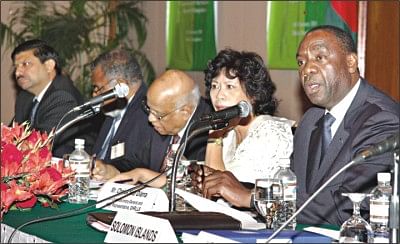LDCs need investment, not aid

Far right, Cheick Sidi Diarra, under-secretary general of United Nations and high representative for the least developed countries, speaks at the high-level Asia-Pacific policy dialogue for the LDCs at Sonargaon Hotel in Dhaka yesterday. Photo: Amran Hossain
Poor nations need investment from developed countries to break the poverty trap and catch up with the rest of the world, said a senior United Nations official yesterday.
“ODA (official development assistance) is good, but the future of LDCs' depends on foreign direct investment,” Cheick Sidi Diarra, under-secretary general of United Nations and high representative for the least developed countries (LDCs) told The Daily Star.
In an interview on the sidelines of the high-level Asia-Pacific policy dialogue for the LDCs at Sonargaon Hotel in Dhaka, Diarra talked about the challenges LDCs face.
Representatives of 15 LDCs have gathered in Dhaka for a three-day conference to review the progress they made in the implementation on the Brussels Programme of Action adopted in 2001.
Diarra, also the special adviser to UN on Africa, believes the developed nations were not as generous as expected in terms of giving official development assistance to LDCs.
LDCs could have achieved more if the financial crisis had not appeared, he added.
"Further success depends on the recovery from the crisis."
He also mentioned LDCs' capacity and their limited product lines. The vulnerability of LDCs to climate change also came up.
But the UN official focused more on the LDCs' need to have foreign investment to upgrade their current position and said investment is needed not only in oil and energy sectors, but also in agriculture and services. He has also encouraged investment in education and infrastructure.
Explaining this extra emphasis on foreign investment, he said: “It can give you the high return."
Diarra advised LDCs on how they can attract foreign investment.
“Some sort of state guarantee may be given to investors. Tax exemption may also be offered to foreign investors."
He said the UN has also been working on how it can drive the flow of investment from the developed countries to the LDCs. "It is increasing, however," he added.
“We will come up with some significant progress on investment at the next year's LDC summit in Turkey,” said Diarra.
But LDCs will have to raise its productivity and quality of products to sustain on the global market, he emphasised.
Diarra blamed the developed countries for not providing their pledged assistance to the LDCs. ODA should be 0.15 percent of GDP to the LDCs, he added.
Of the 31 developed countries (OECD), only nine have reached the target.
According to the UN official, significant progress was made in many areas under Brussels Programme of Action until the global financial crisis surfaced in late 2007.
LDCs have done well in different macroeconomic indicators, liberalisation of economies, governance, social indicators and trade, he added.
But a lot more challenges are ahead. These are how to tackle climate change, increase farm productivity and food security, contain population growth, cut unemployment, raise trade and investment and diversify economies.
[email protected]

 For all latest news, follow The Daily Star's Google News channel.
For all latest news, follow The Daily Star's Google News channel. 



Comments